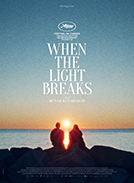When the Light Breaks

| Original title: | Ljosbrot |
| Director: | Runar Runarsson |
| Release: | Vod |
| Running time: | 82 minutes |
| Release date: | Not communicated |
| Rating: |
Mulder's Review
When the Light Breaks (Ljósbrot), directed by the talented Icelandic filmmaker Rúnar Rúnarsson, is a deeply moving exploration of grief, loss and the unexpected bonds that form in the wake of tragedy. Set against the backdrop of Reykjavik, Iceland, the film unfolds over the course of a single harrowing day that changes the lives of its young characters forever. At the heart of the story is a secret, passionate relationship between art student Una, played by Elín Hall, and Diddi, played by Baldur Einarsson. Their relationship is clandestine because Diddi is still in a relationship with his long-time girlfriend, Klara, played by Katla Njálsdóttir. On the eve of their plans for the future together, Diddi promises to break up with Klara. However, fate intervenes cruelly when a catastrophic tunnel fire claims Diddi's life, plunging Una into a whirlwind of grief that she must hide from everyone except Diddi's brother Gunni, played by Mikael Kaaber.
Rúnar Rúnarsson's direction is characterized by a subtle, almost whispered approach to narration, allowing the rawness of grief to seep into every frame. The film meticulously captures the details of loss, transforming ordinary moments into profound expressions of grief and nostalgia. This approach is beautifully complemented by Sophia Olsson's cinematography, whose use of light and shadow creates a visual symphony that underscores the characters' emotional turmoil. Olsson's compositions often emphasize the characters' isolation and loneliness, particularly in scenes filmed from afar, where the vast Icelandic landscapes seem to eclipse the characters, underscoring their solitude in the midst of the bustling city.
Elín Hall's performance as Una is simply extraordinary. She gives a masterful lesson in restrained emotion, with her inner struggle evident even in moments of silence. Una's performance is raw and visceral, making her pain palpable to the audience. Her interactions with Klara, played by Katla Njálsdóttir, evolve from initial tension and resentment to reluctant camaraderie, as the two women navigate their shared grief. Njálsdóttir also shines in her role, bringing depth and nuance to Klara, whose grieving process is equally fascinating. The chemistry between Hall and Njálsdóttir is one of the film's strongest elements, underlining the film's exploration of how loss can forge unexpected and meaningful bonds.
The narrative is also enriched by a keen observation of youth culture, particularly within the artistic community. The young characters, with their experimental haircuts and open-mindedness, embody a defiant spirit in the face of traditional expressions of grief. They seek comfort in each other, their shared experiences forming a tapestry of support and understanding. This communal aspect of grief is poignantly depicted in the scenes where they gather to drink, dance and reminisce about Diddi, creating a visceral representation of the cathartic power of shared grief. These moments are imbued with authenticity, capturing the complexity of young adulthood and the profound impact of losing a friend at such a formative time in their lives.
Rúnar Rúnarsson's decision to avoid blatant melodrama in favor of a more introspective approach is a testament to his maturity as a filmmaker. Instead of relying on dramatic confrontations, the film focuses on the internal struggles of its characters, allowing the audience to identify with their pain on a deeper level. This approach pays off, making When the Light Breaks a deeply moving study of human resilience. The film's musical score, composed by the late Jóhann Jóhannsson, adds an ethereal layer to the narrative, reinforcing its emotional depth. Jóhannsson's use of Odi and Amo is particularly powerful, as a haunting reminder of the enduring nature of love and loss.
Despite its dark themes, the film is not without moments of hope. The evolution of Una and Klara's relationship, and the unwavering support of their friends, suggest that even in the darkest of times, there is potential for healing and connection. This message is beautifully encapsulated in the film's final scenes, where the characters find a semblance of peace in the midst of their grief. The final moments, as Una and Klara watch the sun set over the horizon, symbolize a new beginning, a glimmer of hope that life goes on despite the pain of loss.
The performances of the supporting cast, including Mikael Kaaber as Gunni, Gunnar Hrafn Kristjánsson as Siggi and Ágúst Wigum as Bassi, add depth to the story. These characters form a support network for Una and Klara, and their interactions add layers to the exploration of grief and friendship. The camaraderie between the friends is portrayed with a sense of authenticity, illustrating how young people unite in the face of tragedy.
Rúnar Rúnarsson's When the Light Breaks is a visually stunning and emotionally resonant film, offering a nuanced depiction of grief and the unexpected bonds it can inspire. Rúnarsson's delicate treatment of the subject, combined with powerful performances and breathtaking cinematography, make this a poignant and unforgettable cinematic experience. The film not only explores the depths of personal loss, but also celebrates the enduring strength of the human spirit in the face of unimaginable tragedy. For anyone who has experienced the pain of losing a loved one, When the Light Breaks is a film that will resonate deeply, offering both solace and a reminder of the importance of community and connection in overcoming grief.
When the Light Breaks (Ljósbrot)
Written and directed by Rúnar Rúnarsson
Produced by Rúnar Rúnarsson, Heather Millard
Starring Elín Hall, Baldur Einarsson, Katla Njálsdóttir, Mikael Kaaber, Ágúst Wigum, Gunnar Hrafn Kristjánsson
Music by Kjartan Sveinsson
Cinematography : Sophia Olsson
Edited by Andri Steinn Guðjónsson
Production companies : Compass Films, MP Film, Eaux Vives Productions, Halibut, Jour2Fête, Revolver Amsterdam
Release date : May, 15 2024 (Cannes), December 18, 2024 (France)
Running time : 82 minutes
Seen May 24, 2024 at Gaumont Opéra Premier, Hall 1
Mulder's Mark:

